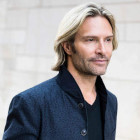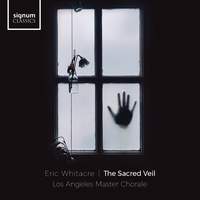Interview,
Eric Whitacre on The Sacred Veil
 Perhaps few living choral composers are as well-known and as well-loved as the USA's Eric Whitacre - shooting to fame in the late 2000s with an instantly recognisable style combining tonal harmony with contemporary touches. It's a voice that has already had a clear influence on a new generation of choral composers, and one that Whitacre continues to develop and refine himself.
Perhaps few living choral composers are as well-known and as well-loved as the USA's Eric Whitacre - shooting to fame in the late 2000s with an instantly recognisable style combining tonal harmony with contemporary touches. It's a voice that has already had a clear influence on a new generation of choral composers, and one that Whitacre continues to develop and refine himself.
His latest project, The Sacred Veil, represents something of a turn away from his focus on relatively small-scale compositions - it's a profound work lasting almost an hour, created in collaboration with his long-time friend, the poet Charles Anthony Silvestri, in memory of Silvestri's late wife Julia. The music sets a number of deeply personal texts that in places seem to look down into something of an emotional abyss, including meditations by Julia herself on her diagnosis and the progression of her illness.
I spoke to Eric about how this work, and the recording of it, came into being.
This was written as an incredibly personal piece, though the experiences it encapsulates are far from unique. Events, though, have since overtaken us with the spread of an unforeseen global pandemic. Grant Gershon’s foreword acknowledges this new context; how much do you think Tony Silvestri’s texts (and your musical settings of them) can be generalised to the times that now confront us?
I would say not at all actually. It’s very, very, very specifically written about grief, loss and love. I suppose there could be parallels drawn to people experiencing that sort of thing now with COVID, about which I am deeply saddened. There’s a timelessness to these very general themes of what it is to lose a loved one, and what it is to struggle with one’s own mortality. But in general, I would say it’s much more specific than that, and not really applicable to what is happening in COVID times.
The combination of choir, piano and cello is a relatively unusual one; what led you to choose these particular forces rather than, say, an a cappella-only sonority or something bigger and more orchestral? Does the cello serve a specific purpose in the music?
That’s a really good question. Initially I thought there would be ten instruments, plus a soprano soloist, and choir. And what happened is during the process (this always happens with me) I start with a lump of an idea, and then I slowly polish it. I try to carve away all the fat from the bone. I remember at some point it went from being a ten-instrument orchestra to being a six-instrument orchestra, then down to a string quartet, and then finally down to just piano and cello. It’s all about trying to get as intimate as possible. With a larger group of instruments, it becomes something different. It becomes presentational in a way. And as the story started to unfold, I wanted to make it as intimate as possible.
Your relationship with Tony Silvestri goes back a long way – his poetry features in some of your most frequently-performed works (Sleep, Leonardo Dreams and others). Did you find the closeness of that friendship fed into the process of composing The Sacred Veil - making it easier or, perhaps, more difficult?
Yeah, Tony and I have been friends for thirty years. I met him in college choir, at the University of Nevada, Las Vegas. Amongst other things, Tony had a profound effect on my musical education early on. He introduced me to the music of Arvo Pärt. He introduced me to the music of the Harmonic Choir. Different authors, different foods. My world changed after I met Tony, and over the years we shared everything with each other. He’s really my best friend in that way, we can talk about anything. And so when we decided to do The Sacred Veil it really wasn’t much of a decision, it was part of a long, rolling conversation that had been already happening for thirteen years since his wife died. And so, in a way, the initial part of the creation was very, very natural. Organic, in a way. The hardest part for me was that once Tony had written the text, I had some heavy lifting to do with the music – I just wanted to get it right. Get it right for Tony. I’ve never wanted to get something right more than I did writing this piece. And that felt like a lot of pressure, that I might not have felt had it been a piece of music that wasn’t so connected to my best friend.
Although Julie Silvestri’s texts at times capture a resiliently humorous approach to the struggles she faced, your musical responses, even to the wry and self-deprecating Delicious Times, are relatively subdued. Did you intentionally decide to steer clear of anything more upbeat, or was that just how things turned out?
I knew Julie really well. Julie was a light – one of the world’s beautiful people. I personally felt I could read below those words; just below the surface. The horror of seeing herself and her body deteriorate as it changed. Even in something as simple as cutting her hair off, she makes it this very brave and positive thing, in a way which she does with her children. But I think I can hear below the words how mortified she was to do it; how difficult it was. I hear more than anything the bravery of her keeping strong for her children. And so, what I was trying to find in the music were those layers. I thought the easy was the surface way, which was just to lean in to the lightness and joking part of it. But actually, the gravity of the situation in the way she writes about it, I think is much deeper than just the surface reading of those words.
Musical definitions have become more fluid in recent years, with works such as Considering Matthew Shepard defying easy categorisation. The Sacred Veil seems similarly hard to pin down, while retaining a clear focus on celebrating the dead and giving solace to those who mourn them. Would you say this work was a kind of 'Requiem' for Julie, or does that label not really fit?
Some of my favourite musical pieces are requiems. I love the Fauré, I love the Duruflé, I love the Mozart. But I wouldn’t think of this at all as a requiem. For me I find the requiem texts very distant, very presentational. I suppose the Dies Irae is always said with a closeness and a rawness, but it never feels like we’re talking about an individual. I never relate to it on a personal level. The whole idea of The Sacred Veil was to be as honest as possible about what actually happens when someone goes through this. Not in a grand, liturgical way, but in a very human, personal way. So, I know it’s been called a ‘requiem’ but I never think of it that way. I think more that this is an attempt to be honest or authentic.
Despite the word 'sacred' appearing in the work’s title and Tony’s evident religious faith, the texts lack explicit references to the divine. Many contemporary choral works reject both sacred and secular, in favour of a more generic sense of 'spirituality', and The Sacred Veil seems to fall within this. Do you think this reflects a trend in society at large – both in the US and more broadly?
I’m not sure if it reflects a trend in society at large. I know that Europe has been for years, and continues to be, moving away from organised religion. I think there’s an argument that can be made that America’s actually moving toward organised religion. I’m not sure what the actual data is, but from my own vantage point here as an American, I would say religion is alive and well and thriving. I am not religious; I am not a Christian. And so The Sacred Veil approaches this with very few references to the divine, only because I think it’s more important to focus on the humanity of the moment. The actual personal events. Now part of that is reflected in Julie’s own faith; we hear that in those words ‘Pray Hard’. But for the most part, this is what happens at the human level.
It’s hardly unusual to perform music dealing with uncomfortable or painful concepts, but often they’re at arm’s length. By contrast, the immediacy and intimacy of Tony’s poems places this work on another level – potentially a very emotionally difficult one for the musicians involved. How did this affect the process of performing and recording The Sacred Veil?
Every single time we’ve done this – I’ve done several different performances with different choirs, and obviously with the Los Angeles Master Chorale during the premiere and recording session – there hasn’t even been one rehearsal where a person hasn’t broken down and had to leave the room. One of the things that I just didn’t realise and what I wasn’t prepared for at all, was how many people have gone through a very similar experience, and I don’t mean just loss and grief, I mean the very specific experience of cancer. In the sixth movement where they say “I’m afraid we’ve found something” and it catalogues Julie’s diagnosis. And I can’t tell you how many singers and audience members I’ve had, even in the few years that the piece has been out, that have come up to me afterwards in tears and said ‘I literally recognise those words, from either my own diagnosis; the diagnosis of my spouse; my parents; my children’. Those exact words. And those exact prescriptions for medication, for chemotherapy. Of course, it’s obvious now, it just didn’t occur to me just how deeply immediate that experience would be for so many people.
And of course, that holds true for singers. Even when we were recording with the LA Master Chorale, there were several people in the choir who were in the process of losing someone to cancer, or someone who’s really struggling with cancer, or recently had someone who had passed. And it was beyond raw for them. It was just too much. For me personally, and I’ve seen this with a number of groups, the Delicious Times poem that Julie wrote; I tried as hard as I could to set it in as simple, straightforward way that was almost conversational. Just in her voice and not over-dramatizing. That is the movement where people really become affected. I think because it speaks to these themes of mortality and suffering, but also to the generosity of human spirit, that is built in. That somehow in that moment she managed to find the strength, and as I said before, the bravery to think of her children first. I think the musicians were deeply affected. Going through the process and in a way each of them had to reconcile how they were going to get from point A to point B; focused on the music and words, giving them to the audience, instead of feeling them outright.
The Sacred Veil is released on Signum on 28th August, and customers who order before the release date will be entered into a draw to receive 1 of 10 copies signed by Eric Whitacre; recipients of the signed copies will be selected at random.
Lisa Edwards, Jeffrey Zeigler Los Angeles Master Chorale, Eric Whitacre
Available Formats: CD, MP3, FLAC, Hi-Res FLAC



